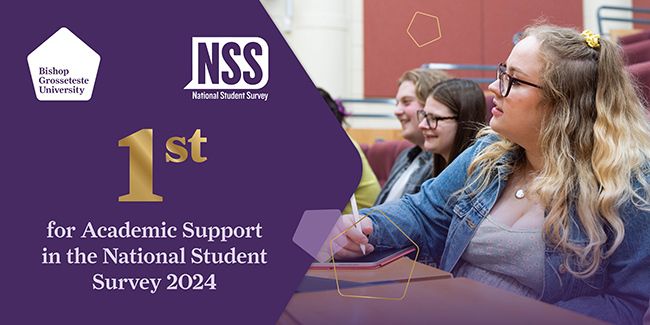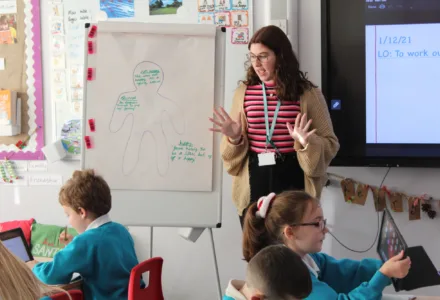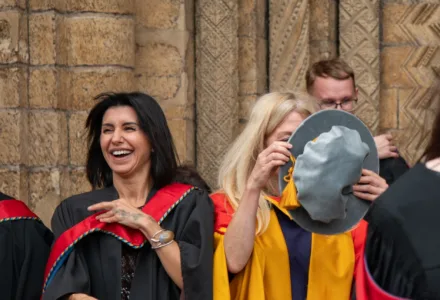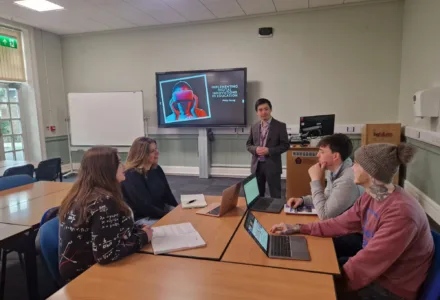✨ Apply now through Clearing - call our dedicated hotline on 01522 583698! ✨
Why study this course
A vibrant course with a dedicated team that provides personalised feedback and support.
Excellent opportunities to develop and practise your teaching knowledge and skills with language teaching experience.
A student-centred learning experience where your interests and passions matter.
Study at a university that has 160 years of experience in education and teacher training.
Course summary
The BA (Hons) Education Studies and TESOL is a brand-new course for 2023/24 at BGU, Lincoln and combines modules from our Education and English Language and Teaching programmes.
Key facts
|
Award |
BA (Hons) |
|---|---|
|
UCAS code |
X163 |
|
Duration |
3 years |
|
Mode of study |
Full time |
|
Start date |
September 2025 |
|
Award |
Bishop Grosseteste University |
|
Institution code |
B38 |
Apply for this course
When you're ready to apply, the route you take will depend on your personal circumstances and preferred method of study. Click the relevant button below to start your application journey.
About this course
Our BA (Hons) in Education Studies and TESOL (Teaching English to Speakers of Other Languages) is the ideal programme for students who wish to pursue a career in education and have an interest in language and the language learning and teaching process. This exciting degree is designed to broaden your ideas and experiences of education, learners, and educational settings, and allows you to keep your options open to make informed choices about your future employment opportunities once you graduate.
The programme provides students the opportunity to engage in study that offers a balanced range of modules from both disciplines. We integrate the theory and practice of education, language learning and teaching to equip you with the academic, vocational, and professional skills and knowledge to start you on your education career path in teaching or non-teaching roles, or prepare you for entry to teacher training programmes to become a qualified teacher, such as a PGCE. Settings in which you gain practical experience may include those at primary, secondary and tertiary levels. You may also work with specific groups of learners, such as pupils who are learning English as an additional language (EAL).
On completion of the degree, you will have engaged with topics that will develop your communication skills, your knowledge of how language is used and perceived, how learners learn, and how educators can tailor teaching and resources to include a diverse range of learners.
What you will study
Students on this course currently study some or all of the modules listed below.
An understanding of how individuals learn and the factors that shape learning is fundamental to any study of education. This Level 4 module will introduces you to a range of key theoretical ideas and principles about learning from birth to adulthood. It explores theories that focus on adult learning, for example andragogy, as well as pedagogical ones that centre around child learners, for example behaviourism and constructivism. The module combines a study of these historical approaches with a consideration of contemporary theories such as heutagogy and factors like education policy that shape, or even determine, learning in the 21st Century. It will enable you to draw on your own experiences of learning and will encourage you to critically engage with theories to identify strengths, limitations and the applicability to educational environments. As part of this module you may work on developing key academic skills that will provide a foundation for academic work at all levels of the programme. Such work may include academic reading skills, for example identifying and reading different types of sources, and academic writing skills, such as structuring written assignments. You will undertake a placement that will enable you to apply theoretical perspectives from the module to understand and reflect on pupils’ learning within the education system. The placement also provides you with the opportunity to begin to develop key professional skills. Teaching and learning will proceed by way of interactives lectures, seminars and tutorials, supported by e-learning and VLE-based tasks. Tutor-led seminars will utilise collaborative group work in order to model and enable learning and assist you in developing the skills to study and learn independently. In this module you will develop subject expertise, professional skills and increase graduate attributes, most notably academic literacies and employability.
Building on the fundamental concepts of learning introduced previously in Level 4, this module focuses on the sociology of education and learning, and, primarily, how academic achievement and educational inequality is shaped by society and educational structures. The module provides teaching and classroom-based experiences through which the impact of a variety of sociological factors, such as socio-economic group, gender, ethnicity and human rights can be better understood. Relevant theories and approaches to explaining differences in attainment will be studied, together with an exploration of factors that might contribute to narrowing gaps in educational outcomes. As part of this module you may be expected to investigate and analyse a range of published sources of data on educational attainment and interventions and so learn to interpret and explain data presented in different ways. You will also undertake a placement that will enable you to apply knowledge gained in the module and further develop your transferable skills of communication and organisation, as well as gain further experiences of supporting learning.
What is the difference between how we produce the sounds 'p' and 'b' ? Why does the rhythm of English sound different to Spanish? What are the processes that allow us to create new words and phrases? In this module you will discover how we describe and analyse the sounds, words and structures of languages, with a focus on English. You will learn the fundamentals of how languages work and how to identify differences and similarities between them. In the process, you will be developing your knowledge of key concepts and terminology that professionals use to support a range of people and their language needs, from learners of English to those with speech and communication disorders.
Through studying this module, you will develop an understanding of the main theories that try to explain how second languages are learned. You will find out what learner language looks like and how it develops, and about bilingualism and other topics that will give you a strong theoretical grounding to prepare for practical language teaching experience in your Level 5 TESOL modules.
Compulsory modules
An understanding of the principles and practice of inclusive education is crucial to those who intend to work in an educational context. This module will introduce you to the philosophical social justice debate and theories and ideologies of inclusive practice, and will examine interpretations of diversity and inclusion in different contexts. Although matters relating to inclusion are embedded in all modules, this offers you the opportunity to study the topic in depth and to critically analyse and apply a range of theories in the context of your work with young people in a range of educational contexts. It will build on the values, beliefs and philosophies explored in Level 4 modules and extend your appreciation of issues of human rights, equality and equity.
This module builds on and develops the basic methods and data interpretation skills developed during Level 4 modules. The module also prepares you for your Dissertation at Level 6 especially if you are intending to pursue a Dissertation (Capstone Project) in Education Studies or other Social Science (at Level 6). You will explore ways in which a range of quantitative and qualitative methods can be brought to the investigation of educational issues. You will apply selected quantitative and qualitative methods and will be introduced to the benefits and difficulties of education research. You will develop your understanding of the range of research methodologies and research methods (data collection tools) that can be used in education research, and further develop your skills of statistical analysis and data interpretation.
The TESOL Methodologies module will guide you through the approaches and techniques that professional language teachers use for teaching English, or other languages, in the UK and all over the world. You will find out about the development of methodologies over time, from audiolingualism to the post-methods era, enabling you to develop a toolkit of techniques that you can select from and identify in practical teaching modules. A particular focus will be how these methods can be applied for the teaching of the four skills: speaking, listening, reading, and writing. Not only will you learn about language teaching methods and approaches, but you will understand the principles that underlie them by examining the relationship between method and general learning, as well as language learning, theories. This part of the study develops your criticality and professional capacity to select appropriate methods and builds on the theoretical knowledge of Second Language Acquisition you gained in Year 1. Further topics covered in the module will include lesson planning, classroom management, teacher and students roles, among others.
This module aims to develop the practical teaching skills and theoretical knowledge needed for the modern language classroom. In order to accomplish this, the module will include four elements.
• Language awareness & Skills
• Developing an Individual Learner Profile
• Study of an Unknown language
• Teaching Skills
You will explore one-to-one teaching methodology, needs analysis, linguistic analysis, lesson planning and syllabus design. This will inform the practical assignment associated with this module and will bring together what you have learnt.
The module covers teaching methodologies and introduces lesson planning, contrastive analysis, teaching skills, teaching practice and related portfolio, guided observation and related journal, course book and materials evaluation.
In this module you will collect your own data in the form of a needs analysis for the Learner Profile and be re-introduced to the importance of ethical consideration in research and the Research Ethics Policy.
Optional modules
This module will draw on and develop your understanding and experience of real- world contexts. Building on placement experiences in Level 4 the module explores the wider role(s) of a professional in a setting. It enables you to apply knowledge and skills in a real-life context offering you a valuable experience to draw on when you present yourself to employers or selectors upon graduation. The module will introduce you to key theoretical ideas and principles related to reflective practice and professionalism. It will provide a critical understanding of successful elements for career development including relevant practical guidance on tools to support this such as individual ‘professional context’ action plans, careers advice, CVs, letters of application and personal statements. The syllabus will include a block placement and the study of reflective practice and student-professionalism. You will be introduced to key educational theorists and philosophers concerned with reflective practice such as Dewey, Schὂn and Kolb and the significant contributions of each. You will reflect on your own approaches to reflective practice and further develop critical thinking. The strengths, limitations and general applicability of reflective practice for professionals will be considered carefully in the light of evidence presented and this will be related to your own work on placement. Workshops provide you with the opportunity to participate in academic practices, including developing academic reading and writing skills at level 5 which is embedded in the context of the taught component. This module is deliberately structured in an open-ended way to allow placement to develop in a manner most suited to your potential future career and to respond to opportunities presented by employers.
In this module you will have the opportunity to analyse and evaluate how English language, in spoken, written or digital forms, shapes meaning for use in fields ranging from media to politics to marketing. You will also explore how factors such as audience, purpose, genre and mode affect our use of language.
Compulsory modules
An awareness of global perspectives on education strengthens Education Studies students’ understanding of educational issues, ideas, and solutions by broadening the scope of study beyond the UK. This module explores the impact of globalisation on education policy and practice in different international settings in varied international, social, economic, and political contexts. The module requires you to take a global perspective on issues and trends such as citizenship, human rights, access to education, and education for sustainable development and relate these to social theories of education and development goals. You will be encouraged to reflect on the global, multicultural nature of our society and your own cultural fluency, and research contrasting perspectives on effective responses to the diversity of international school pupils’ backgrounds, experiences, and needs. You will be required to engage critically with module topics and develop as an independent learner and critical thinker to investigate your chosen area of research.
This module will give you the opportunity to evaluate and design materials for English language teaching use. You will develop a practical understanding of the role, principles and procedures of the design and evaluation of language teaching materials.
In this module you will use your creative skills and imagination to examine innovative ways in the teaching of English. You will have the opportunity to explore how to use technology, augmented and virtual reality and games as tools in English language teaching.
Optional modules
Excellence and innovation in curricula are a central tenet of any world class education system. This highly responsive module provides you with a theoretical and critical understanding of key considerations in the development and implementation of curriculum policy, content and practice in educational settings. The module considers future developments in the current curriculum and possible alternative future directions. It provides you with an opportunity to study this at first hand in placement settings. A range of theoretical approaches to the curriculum will be critically examined. The syllabus may include topics such as differing views of the nature and organisation of knowledge, and examination of various curriculum frameworks, including aims, content and contemporary views of pedagogy. These will vary over time in order to ensure that the module is responsive to new developments and future directions in education for instance decolonising of the curriculum and environmental education. Innovative practice from inspirational educational settings may be showcased in order to provide models of excellence. Placement will allow you to gain real-world experiences of current curriculum arrangements.
This module will build on (EDU50322) Vision to Reality and introduce you to a further range of contexts and settings for learning, examining these from the perspective of educators and learners, policy and practice. Throughout the module you will be encouraged to consider and appreciate the scope and limitations of education within a variety of teaching and learning environments and organisations. You will be introduced to a wider and more complex range of research and theory related to the benefits and limitations of teaching and learning in informal and alternative learning environments alongside the unique personal embodiment / impact of these on the overall experience of learners and educators. You will consider how pedagogical approaches are utilised in these contexts and how such contexts are positioned in contemporary educational policy. You will develop and apply skills of critical analysis in module sessions and independent learning. First hand experiences of different learning contexts through study visits and work with visiting experts will be threaded through the module as a basis for comparison, analysis, evaluation and reflection.
This module will provide you with skills and knowledge needed to design, conduct and report a substantial dissertation on a subject of interest to you and of relevance in the current context of education. You will gain an understanding of different methodological approaches and perspectives on educational research and be encouraged to articulate your own epistemologies and ontologies. Taught sessions will help to inform and scaffold the your planning process and provide a range of methods for sourcing, collecting, collating and analysing both primary (collected on placement) and/or secondary data in the construction of the written work. The module will ensure that your understanding of research ethics and integrity is embedded at all stages of your dissertation including gaining ethical clearance for primary research. Consideration is given to the potential positive ‘legacy’ of your research in practice. You will build on the research skills imparted earlier in your studies, at all levels, applying them in a more independent manner. The module will deepen and refine your knowledge of your specialist area and offer insights into the construction of longer pieces of analytical written work, and the way in which arguments are mediated in them. Opportunities to share and refine ideas at all stages will be supported by group work and supervisory tutorials. Links with university services offering additional expertise relevant to supporting your research skills and writing will be integrated and signposted in the module.
This module will introduce you to the basic principles of how teachers construct and present English language tests. You will look at the different purposes of tests and you will critically evaluate testing techniques.
This module intends to bring the knowledge you have acquired during your studies in BA in English Language and Teaching. You will demonstrate your ability to design, conduct and report the results of a research project in an area of TESOL and/or Linguistics. You will work independently, under the guidance of a supervisor. You will draw upon the skills acquired during the research skills module and academic writing, conduct independent research and write a dissertation on any topic related to the modules you attended during your three years of study.
During the module you will have the opportunity to attend/ or deliver further sessions about the skills required to design and carry out independent research in the area of applied linguistics and teaching English to speakers of other languages (TESOL). The key research approaches and a variety of research methods used in investigating language teaching and learning will be further explored and discussed. such as action research; case studies; ethnography; qualitative and (or) quantitative research; mixed methods).
The module will also take a step-by-step approach through the process, from getting to know the key concepts involved in applied linguistics research, to the design, carrying out a research project, and interpreting the research findings. This includes the following topics. Collecting Data Issues; Ethics, Designing Questionnaires, Designing Interviews, Designing Surveys, Conducting Observations and Interpreting Qualitative Data.
Entry requirements
You will normally need 96 UCAS tariff points (from a maximum of four Advanced Level qualifications). We welcome a range of qualifications that meet this requirement, such as A/AS Levels, BTEC, T Levels, Access Courses, International Baccalaureate (IB), Cambridge Pre-U, Extended Project etc.
However this list is not exhaustive – please click here for details of all qualifications in the UCAS tariff.
Find out more about the international application process including English Language requirements.
If you don’t have, or don’t think you will attain the normal tariff points for studying at BGU, click here to view Foundation Year courses.
Further information
In accordance with University conditions, students are entitled to apply for Recognition of Prior Learning, RP(C)L, based on relevant credit at another HE institution or credit Awarded for Experiential Learning, (RP(E)L).
How you will be taught
There is no one-size-fits-all method of teaching at BGU – we shape our methods to suit each subject and each group, combining the best aspects of traditional university teaching with innovative techniques to promote student participation and interactivity.
You will be taught in a variety of ways, from lectures, tutorials and seminars, to practical workshops, coursework and work-based placements. Small group seminars and workshops will provide you with an opportunity to review issues raised in lectures, and you will be expected to carry out independent study.
Placements are a key part of degree study within many courses at BGU. They provide an enriching learning experience for you to apply the skills and knowledge you will gain from your course and, in doing so, give valuable real-world experience to boost your career.

Assessment
In Education Studies, assessment is carried out through coursework of different types, including essays, reports, oral presentations, multimedia presentations, reflective logs and portfolios. There are no examinations. You can expect to give one or two oral presentations or poster presentations as one of a small group of students throughout the course. You will gradually build up skills of multimedia presentation and third-year students currently share a short, assessed multimedia film to their peers. You will build up your writing skills steadily throughout the course and in the first year, you will complete a portfolio of shorter written pieces and two longer essays, receiving formative feedback from your tutors to help you build up your academic capabilities.
Assessment in English Language and Teaching is an integral part of your learning here at BGU and takes a variety of forms. Students will generally be assessed through a wide range of methods such as assessed presentations, written assignments, online discussion and ICT based tasks, teaching practice and portfolios of work. A research project in the form of the final dissertation in the third year of the course will encourage students to become research-informed English language teachers who have the ability to make knowledgeable judgements about their own practice.
Careers & Further study
Education Studies
Education Studies graduates enjoy very high levels of employability – the course facilitates your personal and professional employability skills through regular work based placements – and our students are in high demand. Currently, around 70% of our students complete a teacher training course and will go on to be highly successful Primary or Secondary teachers. An Education Studies degree from BGU means your career opportunities are diverse. In addition to careers in education, Education Studies graduates are well placed to work in other education related, health, social care, public information or communication sectors. The course provides good training for a role within business, service industries, personnel, museums, galleries or charities. The diverse nature of this course will also enable you to go onto further study such as postgraduate study on a master's degree.
TESOL
BGU boasts extremely high employability ratings and our BA English Language and Teaching course will provide you with a solid foundation in English Language and Teaching. With your degree you can continue your professional development in English language teaching, education, speech and language therapy, media and publishing, both in international and UK contexts. You will also have the opportunity to pursue further studies within a field of linguistics. Alongside the BA, if you wish to progress towards achieving QTS, opportunities exist to complete our pre-teaching course which can assist you with gaining a place on one of our PGCE courses.
What Our Students Say
Discover what life is like at Bishop Grosseteste University from our students.
Support
Studying at BGU is a student-centred experience. Staff and students work together in a friendly and supportive atmosphere as part of an intimate campus community. You will know every member of staff personally and feel confident approaching them for help and advice, and staff members will recognise you, not just by sight, but as an individual with unique talents and interests.
We will be there to support you, personally and academically, from induction to graduation.
Fees & Funding
A lot of student finance information is available from numerous sources, but it is sometimes confusing and contradictory. That’s why at BGU we try to give you all the information and support we can to help to throughout the process. Our Student Advice team are experts in helping you sort out the funding arrangements for your studies, offering a range of services to guide you through all aspects of student finance step by step.
Undergraduate course applicants must apply via UCAS using the relevant UCAS code. For 2026 entry, the application fee is £28.95, and you can make a maximum of 6 choices.
For the 2025 cycle, UCAS is removing the undergraduate application fee for any student who is/or has received free school meals (FSM) during the last six years, up until the end of their final year at school or college. More information on the UCAS fee waiver can be found here.
For all applicants, there are full instructions at UCAS to make it as easy as possible for you to fill in your online application, plus help text where appropriate. Full details of all tuition fees can be found here.












































